My easy sourdough bread recipe is perfect for enjoying on its own or using for sandwiches! I’ll be walking you in detail through every step so you can learn how to make perfect sourdough like a pro. Recipe includes a how-to video!
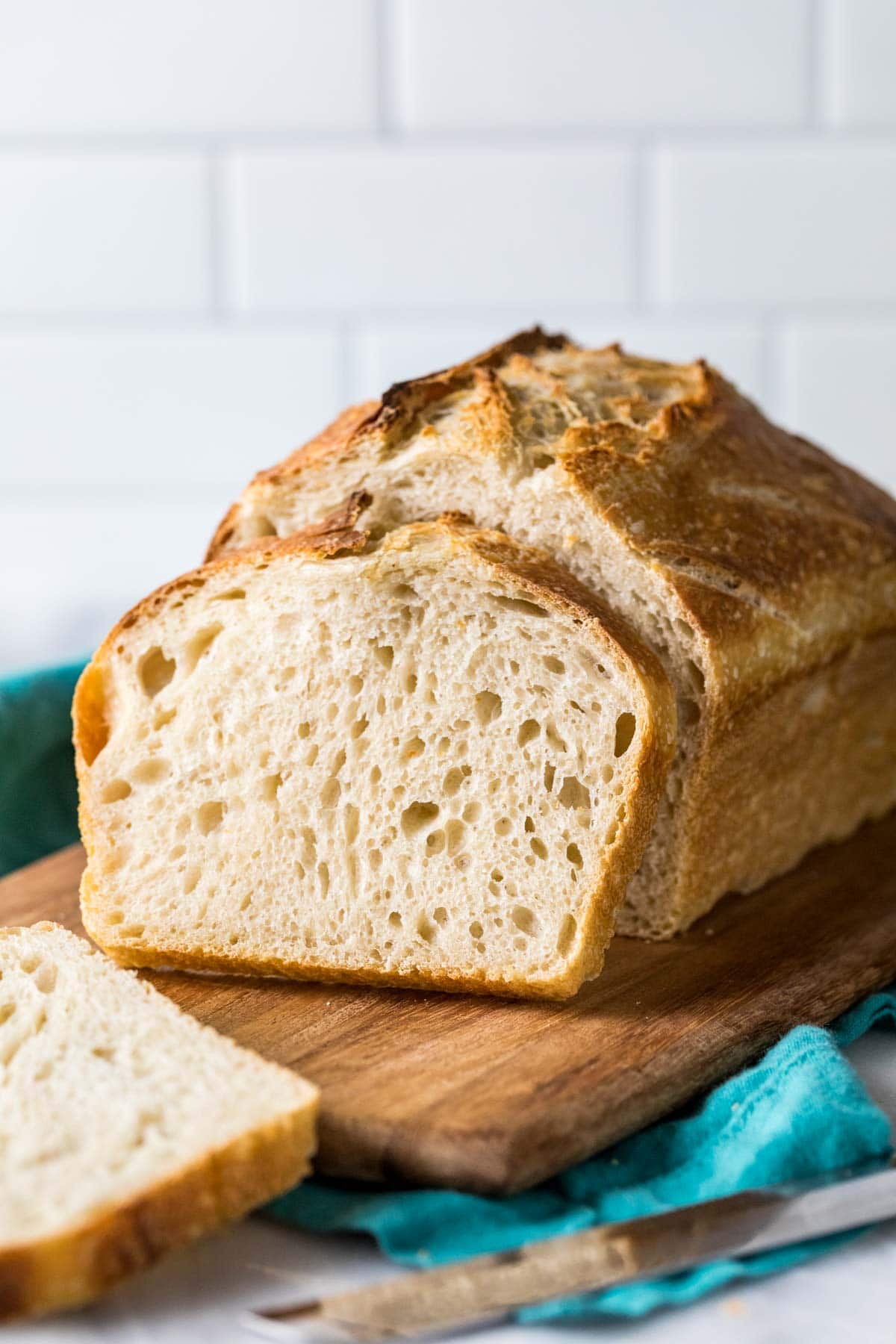
The Best Sourdough Bread Recipe
My easy homemade sourdough bread is the only bread we eat in my household anymore. In fact, I make 2-3 loaves a week and keep a stockpile in my freezer at all times (handy for making sourdough homemade croutons and breadcrumbs)! And once you try it… well, I think you will, too.
That’s because there’s a lot to love about sourdough bread. First and foremost, it has a high nutritional value and none of the additives (no added sugar, either) you’ll find in most store-bought breads. It also tastes amazing: classic, hearty bread (that’s not overly sour) with a thick, crusty exterior and a soft, springy interior.
But what I think you’ll love most about my recipe is how wonderfully versatile it is. It’s ideal both for dipping in soup, serving as a side with a salad, or using as a sandwich; it also makes an awesome grilled cheese that pairs beautifully with my tomato soup!
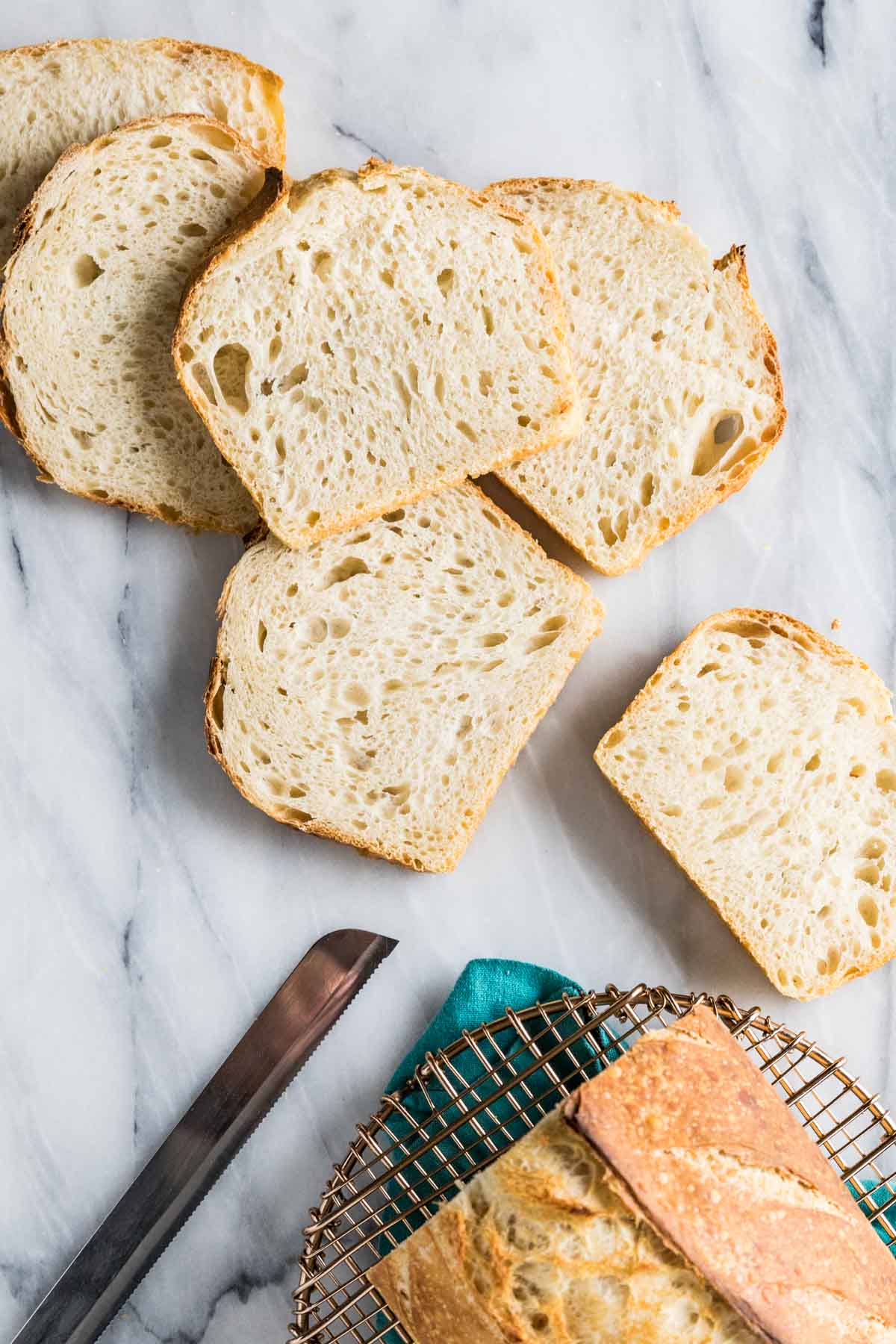
Homemade Sourdough is Easier Than You Think!
Making sourdough bread at home is shockingly easy, especially if you use the sourdough starter I shared last week. It is time consuming and you must have patience, but the work itself is very approachable and I wanted to share a version that was easy to follow–perfect for beginners and advanced sourdough bakers alike.
There’s no kneading involved; instead, we’ll use the easy process of stretching and folding, which develops the gluten much like kneading would, but is better suited for higher hydration dough like sourdough. There’s also no mixer or fancy equipment needed with my recipe — you don’t even need a banneton or a Dutch oven, just a pair of bread pans!
Let’s get started (and after you try it, pat yourself on the back and leave me a comment to let me know how you like it!).
What You Need
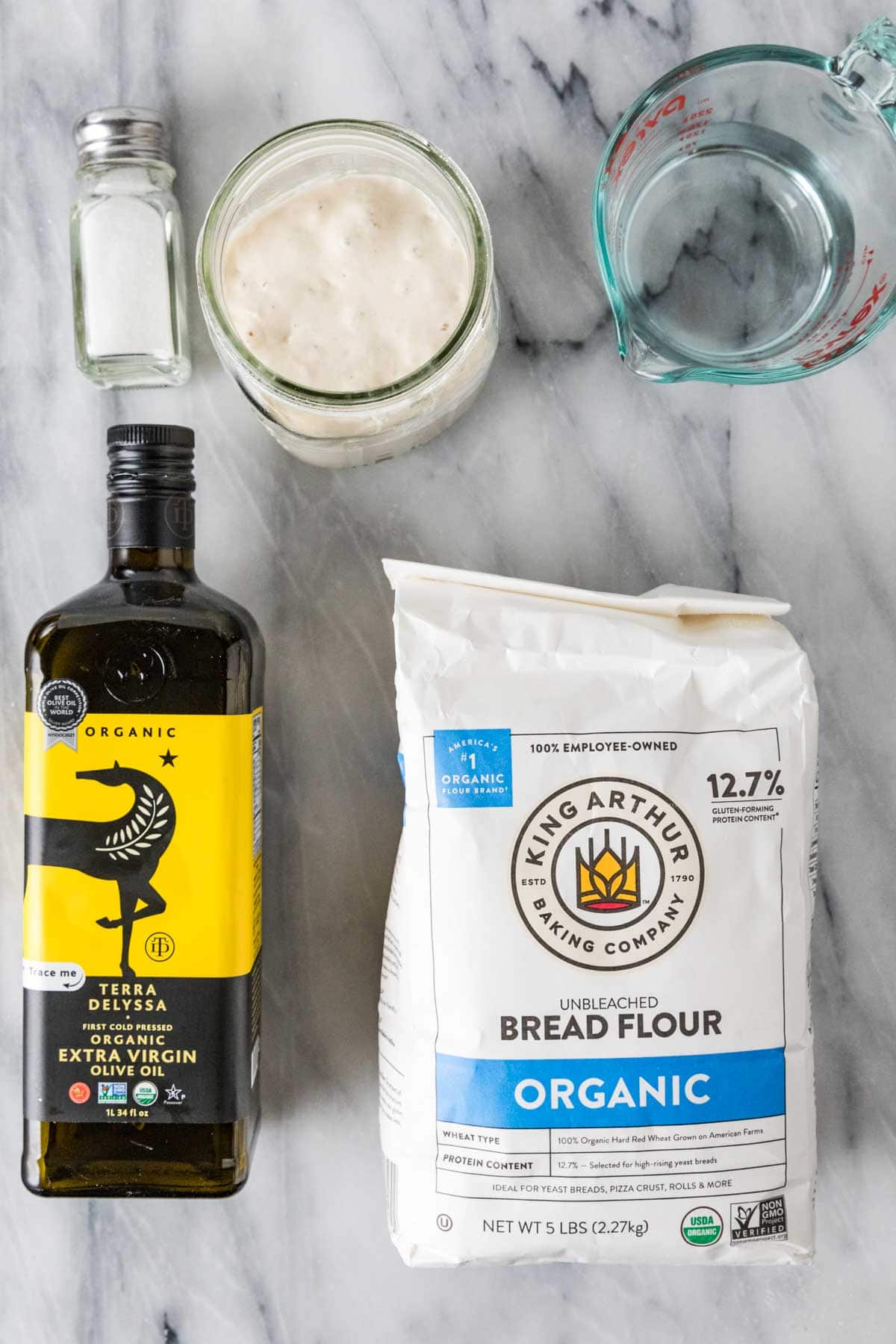
- Sourdough starter. This can be homemade or store-bought. Obviously, I recommend making your own by using my sourdough starter recipe (this does take over a week to prepare, but it’s worth it!).
- Bread flour. I really recommend bread flour over all purpose for my sourdough bread recipe. Bread flour has a higher protein content and produces a better-crumbed sourdough bread, in my opinion. If you don’t have it, all-purpose is not as great but will be “fine”, but try it at least once with bread flour.
- Olive oil. A bit of olive oil helps make the bread perfectly chewy and soft. I also find it keeps my sourdough softer longer.
- Salt. Salt is critical for flavor (unsurprisingly) but it also plays some other important roles in sourdough bread. It helps balance the acidity from our starter, strengthens the gluten in the dough (important for shape and texture), and it even helps extend the shelf life of the bread by acting as a natural preservative. Don’t let anyone tell you it’s going to hinder your yeast, it won’t (or at least won’t to any noticeable degree and your sourdough will be worse off without it).
- Water. The water called for in my recipe will yield a sourdough loaf that is about 70% hydration. I love this hydration level; it produces a crumb that’s neither too dense nor too open, that’s not too sour but is still flavorful, and that is easy to shape and extremely versatile — we use it for everything from dipping in pot pie soup to eating sandwiches. Once you’re comfortable baking a bread at this hydration level, you can experiment with increasing the water if you’d like. More water usually yields a bread with a more open crumb, a more tangy flavor, and a crumb that’s less suitable for sandwiches but good for dipping.
I wrote this sourdough bread recipe with weights because I find it’s the easiest way to make it (just like with my macaron recipe); however, I have included cup measurements as well.
SAM’S TIP: While some people like to bake their sourdough bread in a dutch oven, I like to use a pair of bread pans. It doesn’t look as rustic this way, but it’s much more practical for my family to have a loaf of bread rather than a round of it. If you’re team Dutch oven, don’t worry–I provide instructions for how to make sourdough bread in a Dutch oven below.
Remember, this is just an overview of the ingredients I used and why. For the full recipe please scroll down to the bottom of the post!
How to Make Sourdough Bread
Make the Dough
The first 4 steps in my sourdough bread recipe are the “autolyse” period (or sometimes called an “inclusive autolyse” because we are incorporating all of our ingredients at this point). This step helps boost fermentation, improves the texture (more open crumb!) and flavor, and makes the dough easier to work with.
Note that I do, quite intentionally, include salt in this first step. Some bakers argue that salt will inhibit the yeast growth and negatively impact the crumb. Not so! With the duration of this autolyse and the composition of this particular sourdough bread recipe adding salt at this stage does not make a difference. Leaving it out for this step only makes it more difficult to incorporate later and increases your likelihood of accidentally forgetting to add it altogether (which would be a shame!).
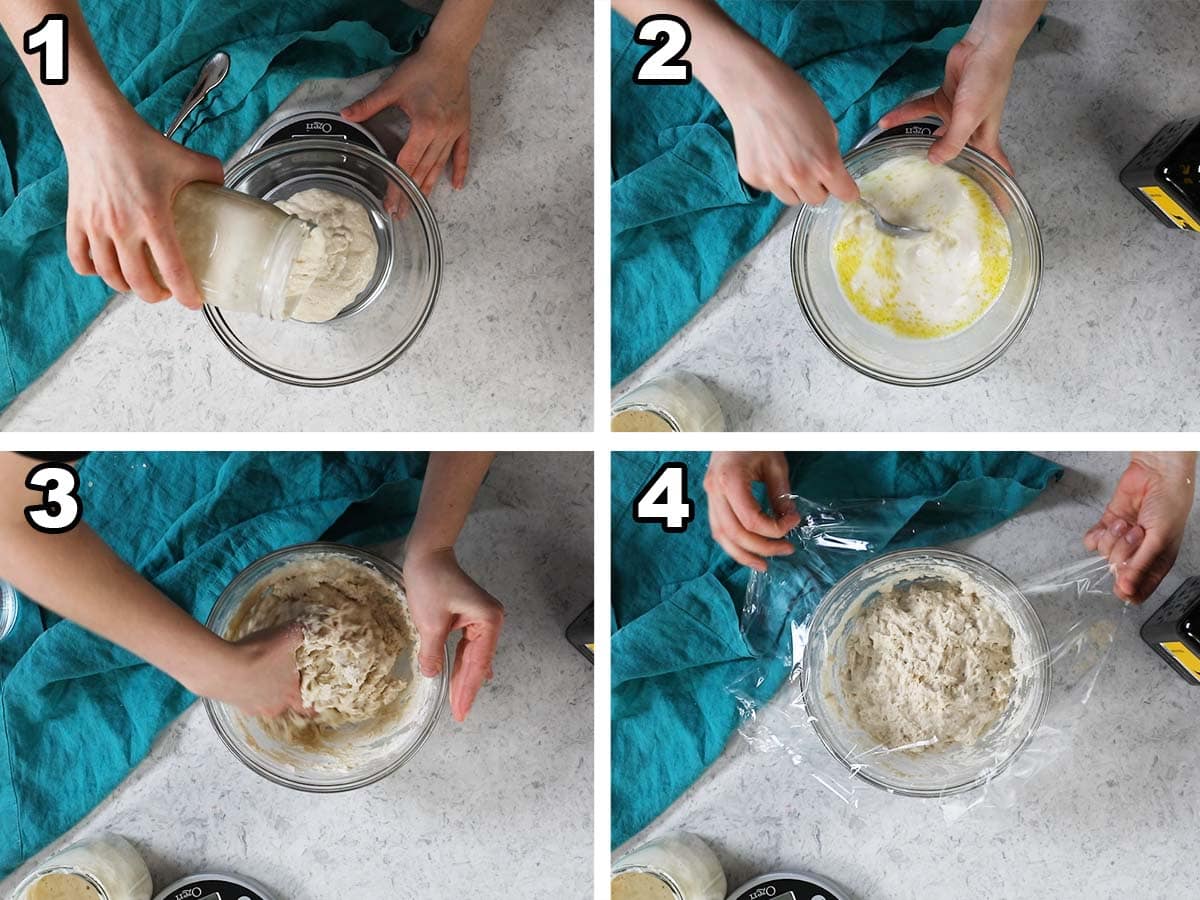
- Combine sourdough starter, water, and oil in a large bowl. Make sure your starter is active and bubbly before adding it.
- Add the bread flour and salt.
- Stir until mostly combined (your dough will still look shaggy). Do not over-mix!
- Cover and let sit at room temperature for one hour.
Stretching & Folding Your Sourdough
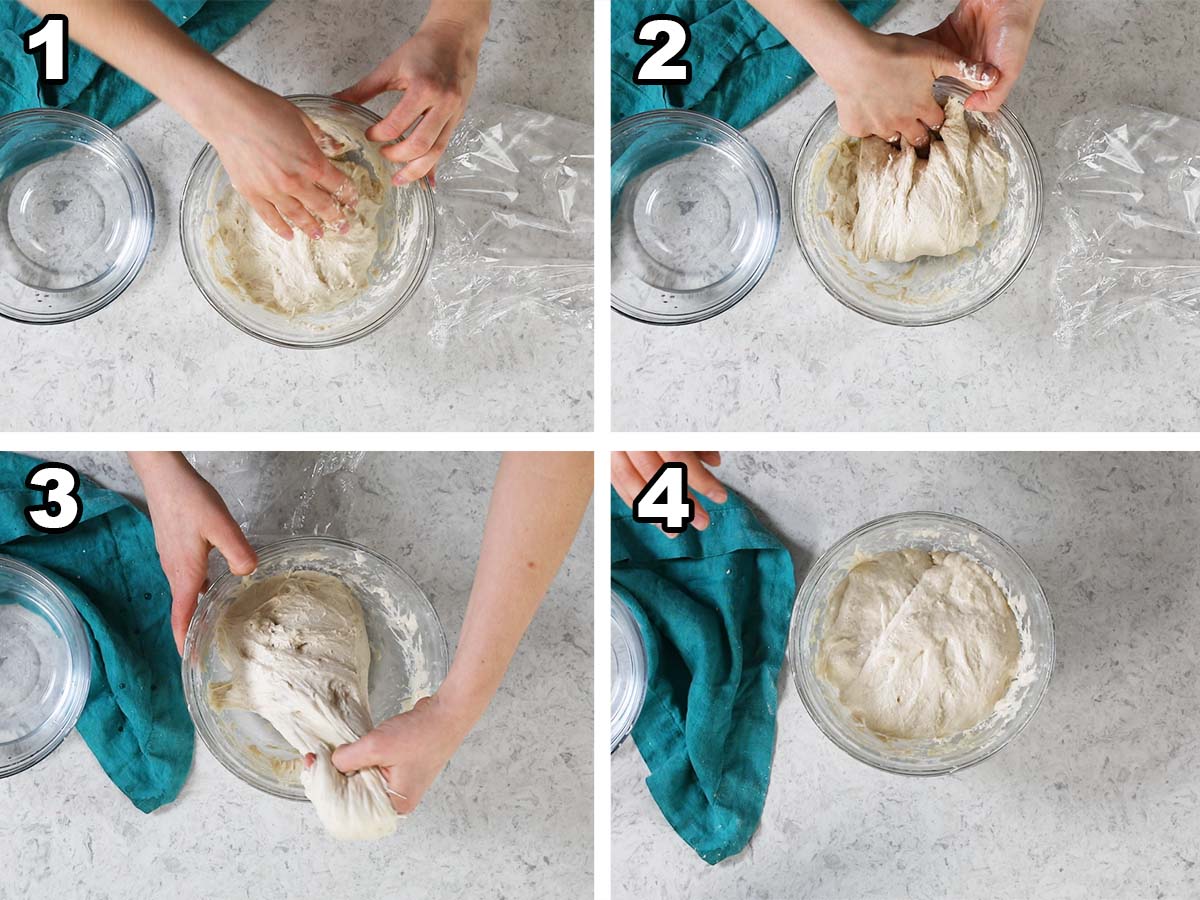
- Form your dough into a ball using your hands, the run your hands under cool water.
- Stretch the top of the dough up and over the bottom, then turn the dough 90 degrees and repeat. I demonstrate this in the video below if you need a better visual.
- Repeat the stretch and fold process a total of four times, then cover and place in a warm place to rise for 30 minutes.
- Let your dough rise until increased in size by 80%, repeating the stretch and fold process every 30 minutes.
Assembling
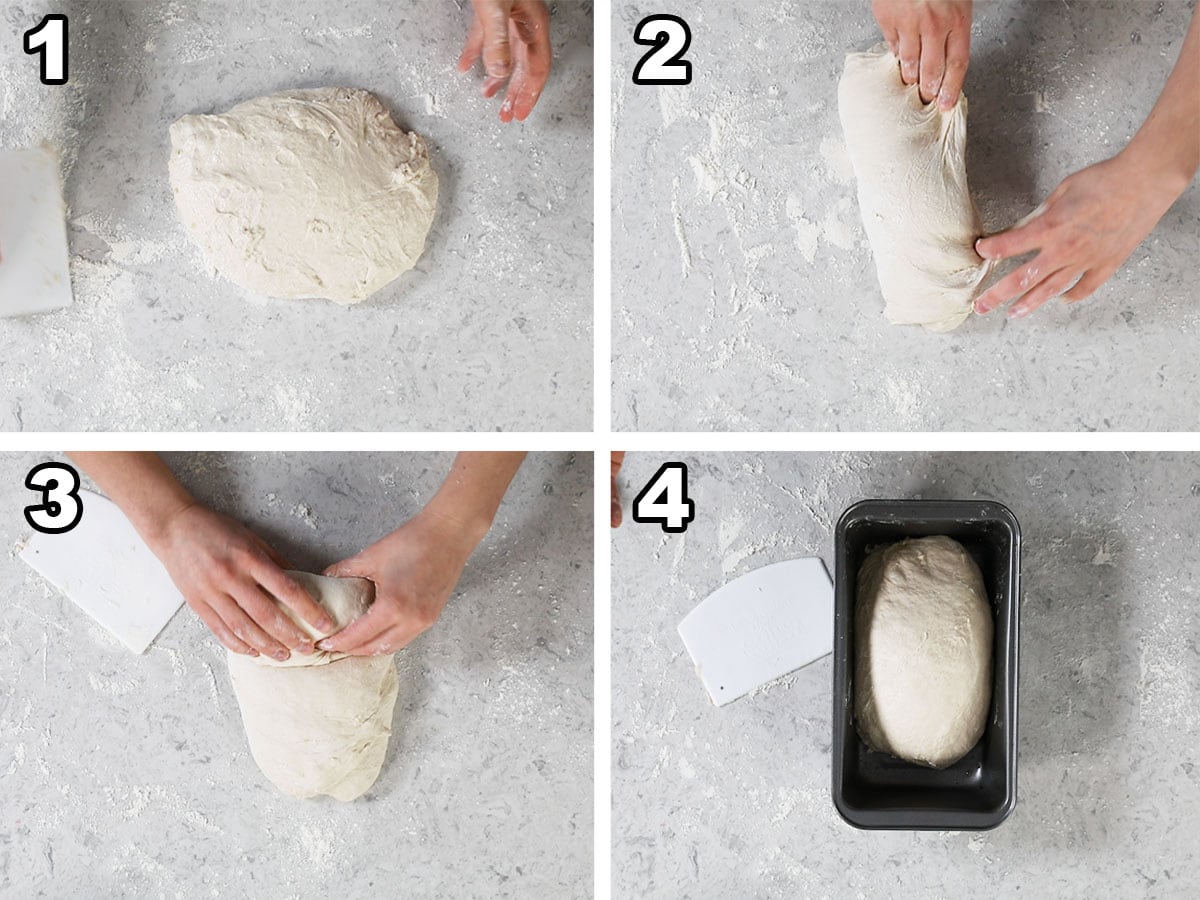
- Deflate and form your dough into a rectangular shape on a lightly floured surface.
- Lift the right side of the dough, fold it over to the center, then repeat with the left side (like folding a paper in thirds).
- Roll into a tight log starting with the short end of the rectangle, then tuck the ends under.
- Place in a greased bread pan, cover loosely, and place in the fridge to rest overnight.
SAM’S TIP: I recommend proofing your dough in the refrigerator overnight rather than baking right away (I also provide instructions for baking right away, though). Proofing overnight will help develop the flavor, help the bread rise better, and encourage more fermentation. That being said, I don’t like to let my dough sit in the fridge for longer than 48 hours (absolute max) before baking. Letting it sit too long can cause over-proofing and can compromise the final texture of your sourdough bread. I also don’t freeze my dough before baking, so I can’t advise on that.
Baking
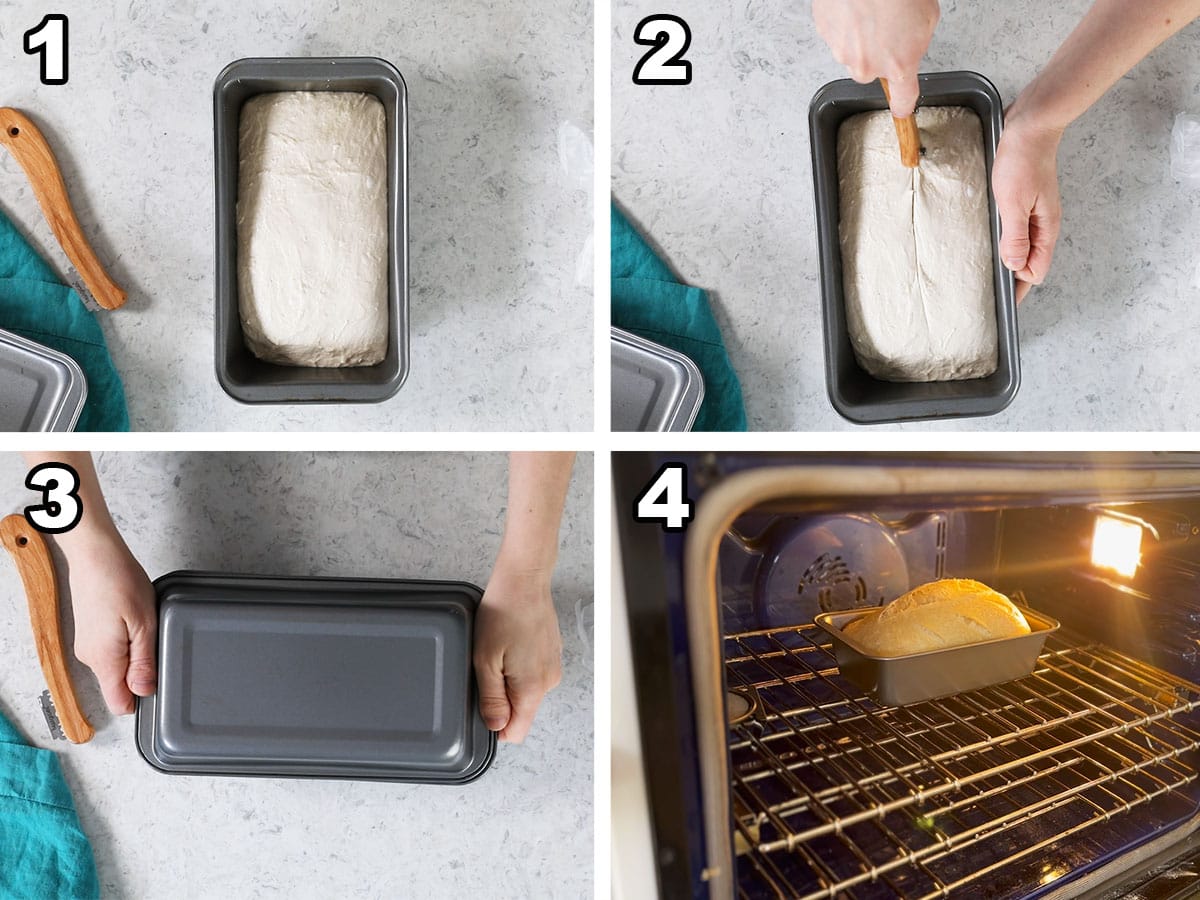
- Let the dough rest at room temperature while your oven preheats.
- Score the bread about ¼″ deep down the center.
- Cover with another bread pan or an aluminum foil tent.
- Bake at 450F for 30 minutes, then remove the cover and bake for 20-23 minutes or until the bread reaches an internal temperature of 206F (97C).
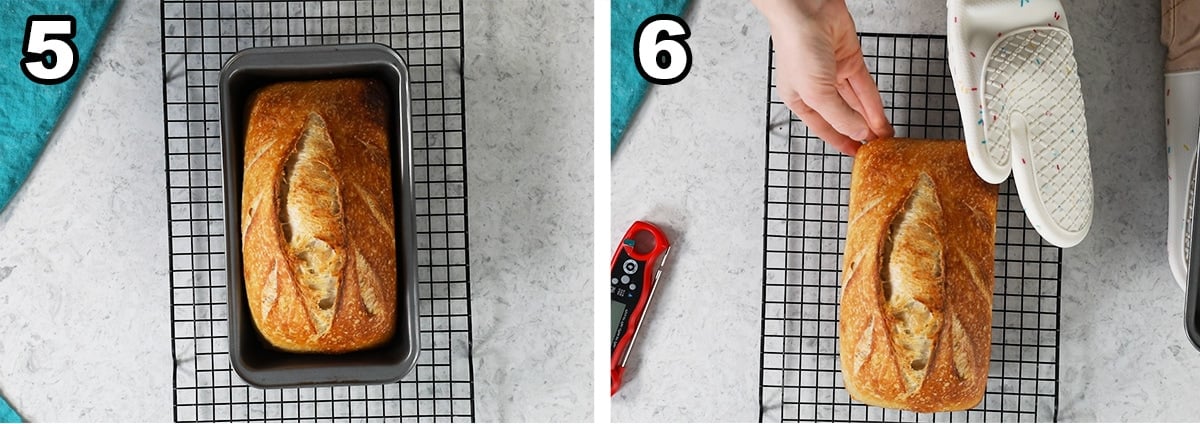
- Let the bread cool in its pan for 15 minutes.
- Remove the bread from the pan (carefully, it’s still hot!) and place on a cooling rack. Don’t let it sit in the bread pan too long, or your sourdough bread could end up soggy from the steam that it releases in the pan that can’t escape. Once removing to a cooling rack, allow the bread cool completely (or at least almost completely) before slicing.
SAM’S TIP: Don’t cut into the bread while it’s still warm (I know, so hard, so tempting!). Doing this can make your loaf gummy and dense.
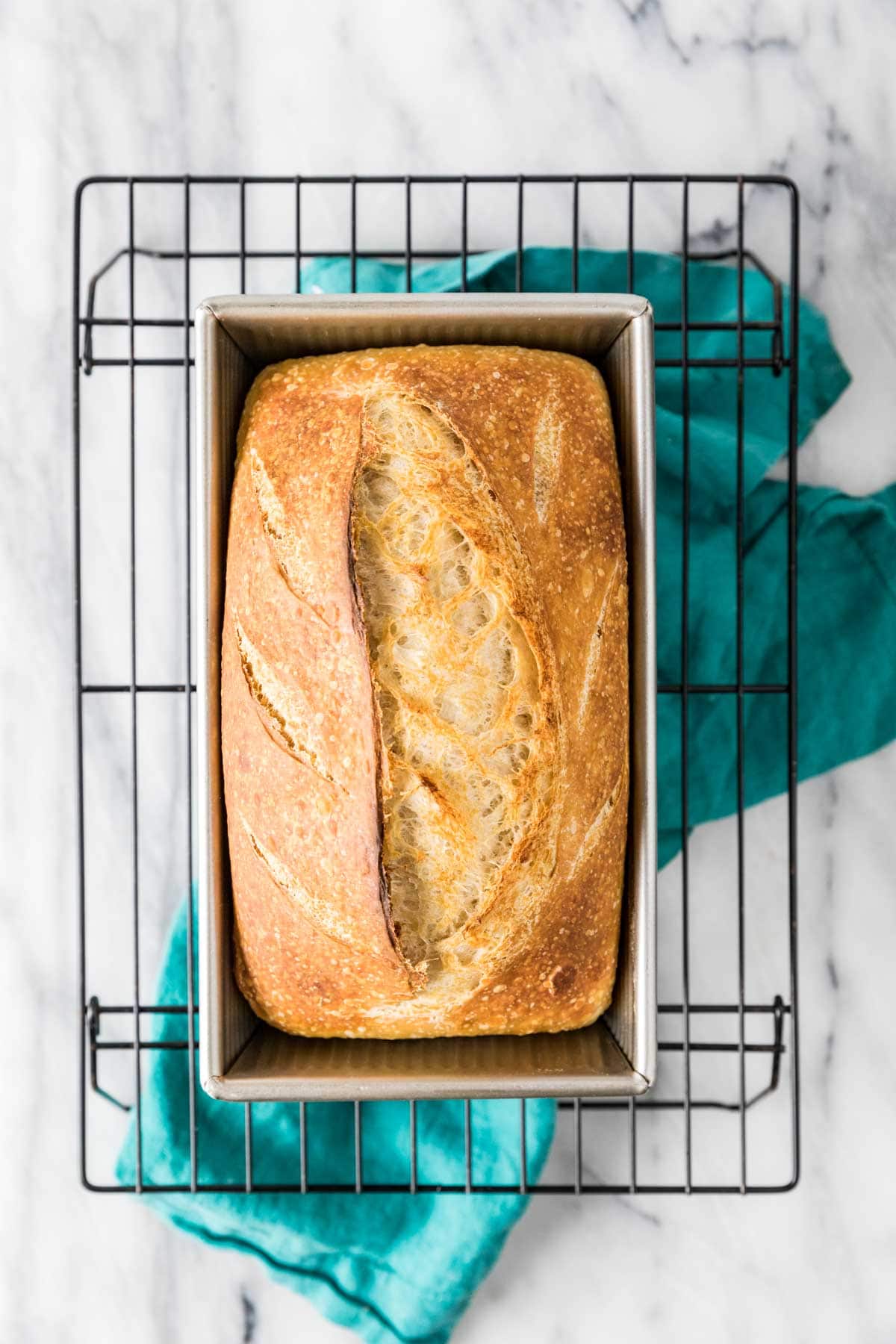
Frequently Asked Questions
Sourdough is definitely one of the more nutritious types of bread. It’s prebiotic-rich, made by fermenting dough with wild yeast and bacteria (sounds not-so appetizing but in reality is delicious) and is more digestible than your standard white bread. It also has a lower glycemic index and less gluten than normal bread. If you’re going to be indulging in bread, this is arguably a better option than standard white bread.
While a traditional sourdough bread recipe is obviously not gluten free, sourdough bread is sometimes tolerated by people who are gluten sensitive (but not people with Celiac Disease). This is because some of the gluten is consumed during the fermentation process, which makes the bread more easily digestible.
Yes, of course! I wanted to share an easy sourdough bread recipe that can be made with basic kitchen equipment, but you can just as well use a Dutch oven. Follow the written recipe through the rolling and tucking step, then place the dough in a lightly floured banneton (I use my Kitchenaid mixer bowl lined with a lightly floured kitchen towel, because I don’t actually have a banneton). Cover and let rise overnight in the fridge.
The next day, carefully turn out your dough onto a large piece of parchment paper and carefully lower this into a 4.5qt Dutch oven (a larger one would work, but your bread will be flatter and will likely cook faster). Allow the dough to sit uncovered while the oven preheats, then score, cover with a lid, and follow recipe instructions for baking.
You can preheat your Dutch oven (as I do in my artisan bread recipe) to make it nice and hot before adding your dough if you’d like, but honestly I rarely do this step with this recipe.
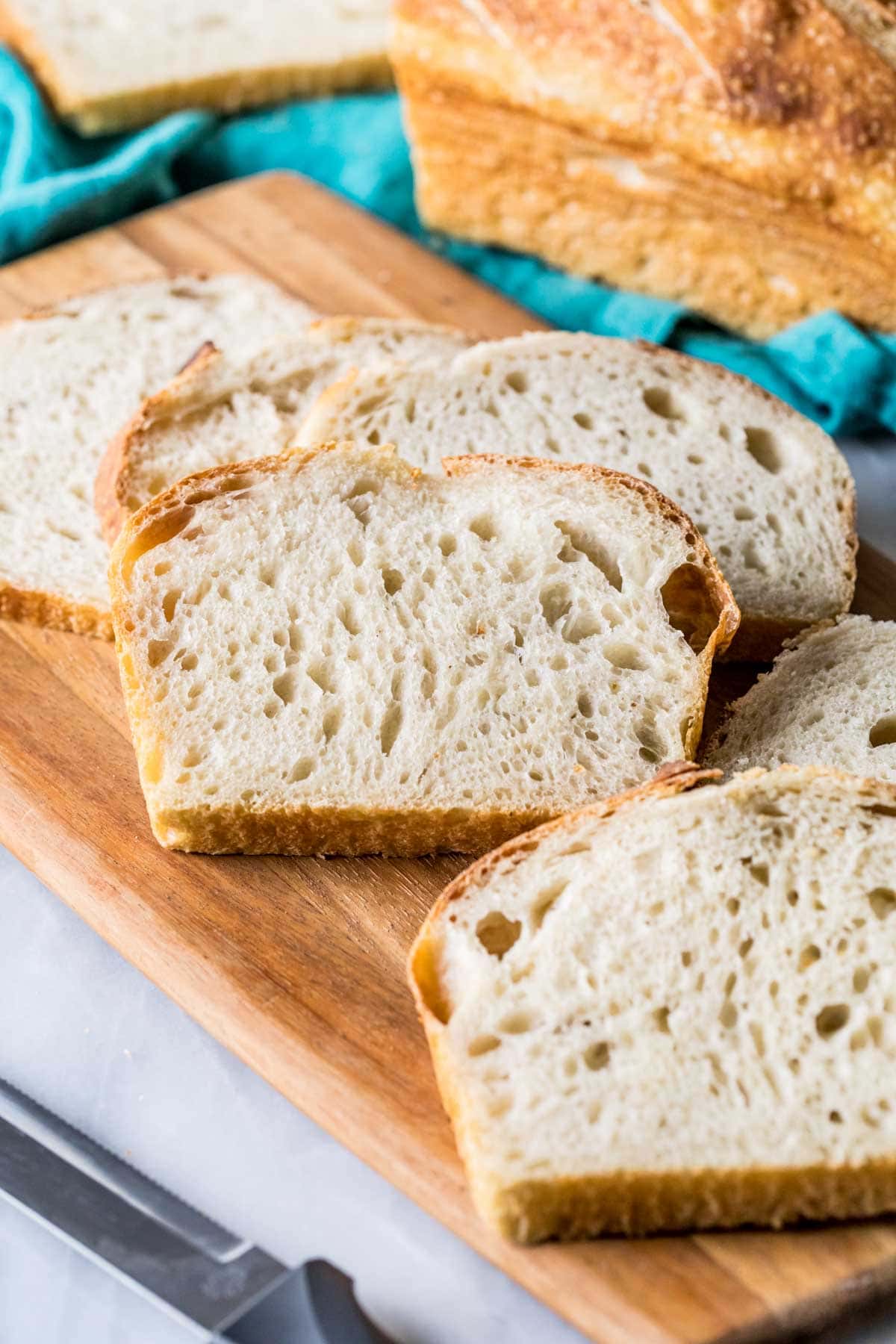
I know that there are many sourdough bread recipes out there and so many different ways to make it, but this is my personal favorite version that I’ve carefully developed over the past year. I can’t wait to hear how you like it (let me know in the comments!), I hope you’ll always want to keep a loaf in your house, too! ❤️
Enjoy!
If you try this recipe, be sure to tag me on Instagram, and you can also find me on YouTube and Facebook
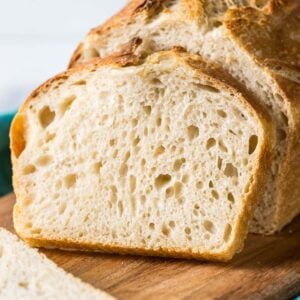
Sourdough Bread Recipe
Ingredients
- ⅔ cup (150 g) active starter bubbly, active, fed
- 1 ⅓ cups (315 g) warm water 90F
- 1 ½ (18 g) Tablesoons olive oil
- 3 ⅔ cups (450 g) bread flour
- 2 teaspoons (13 g) table salt
- Oil for greasing pan
- Additional flour for dusting work-surface
Recommended Equipment
- Bread lame (optional, or use sharp knife)
Instructions
- In a large mixing bowl, combine sourdough starter, water, and olive oil. Stir until combined.⅔ cup (150 g) active starter, 1 ⅓ cups (315 g) warm water, 1 ½ (18 g) Tablesoons olive oil
- Add bread flour and sprinkle salt overtop. Use your (clean) hands or a wooden spoon to stir together until dough is mostly combined. It will still be a bit shaggy and should not be cohesive (don’t over-mix) but no dry patches of flour should remain.3 ⅔ cups (450 g) bread flour, 2 teaspoons (13 g) table salt
- Cover bowl with plastic wrap and let sit undisturbed for one hour (this is the “autolyse” period).
Stretch & Fold
- Form dough into a ball with your hands.
- Run your hands under cool water (prevents sticking!) and grasp the top of the dough and stretch it over the bottom. Turn the dough 90 degrees and repeat. Turn 90 degrees and repeat again, then once more (four total stretch & folds).
- Allow dough to rest, covered, in a warm place for 30 minutes.
- Repeat step 2 above every 30 minutes as dough rises.
- Allow dough to rise (stretching and folding every 30 minutes as indicated) until dough has increased in size about 80% (how long this takes depends on the temperature of your kitchen, typically mine is ready within 4-6 hours).
Forming the Dough
- Lightly grease a 9×5 loaf pan (with olive oil or butter) .Oil for greasing pan
- When dough has risen sufficiently, turn it out onto a clean, lightly floured surface.Additional flour for dusting work-surface
- Use your hands to gently deflate the dough and pat it into a rectangular shape. Lift the right side of the dough and fold it into the center (almost as if you were closing a book). Then, lift the left side of the dough and fold it over the first fold (use a bench scraper if the dough is sticking to your counter).
- Starting with a skinny end, tightly roll the dough, as if you were rolling up a cinnamon roll. Tuck the ends under and carefully transfer to prepared bread pan. Don’t worry if the bread doesn’t fill the pan right now.
- Cover pan tightly with plastic wrap and transfer to the refrigerator to rest overnight/for 12-24 hours.
Baking
- Remove sourdough from the refrigerator and preheat oven to 450F. Let oven preheat and dough rest (covered or uncovered) for at least 30-35 minutes before proceeding.
- Once oven has preheated, uncover bread, make a clean slice (about ¼” deep) down the center with a sharp knife or bread lame (to score it) then cover with another 9×5 pan (if you don’t have a second pan, you may instead make a makeshift oven using aluminum foil; tent it as high as the bread pan is deep).
- Transfer to center rack of preheated oven. Bake, covered, for 30 minutes then remove the lid and continue to bake another 20-23 minutes/until golden brown and the center of bread reaches 206-208F (97C).
- Allow bread to cool in pan for 15 minutes before gently turning it out onto a cooling rack (careful, the pan will still be hot!) to cool for at least 1-2 hours (until it no longer feels warm) before cutting into it.
Notes
To bake the same day:
Follow recipe through step 4 under the “Forming the Dough” section. Immediately after transferring dough to pan, preheat oven to 450F (230C). Allow dough to rest uncovered while oven preheats, at least 30 minutes. Once oven is preheated, follow directions in recipe starting with step 2 under the “Baking” section. Note that bread will not be as flavorful or nutritious & texture will not be as great if it is not allowed to sit in the fridge overnight.Storing & Freezing
Store in an airtight container at room temperature for up to a week. You may also freeze this bread. Freeze the whole loaf by wrapping tightly in plastic wrap and then wrapping in foil. When ready to thaw, keep covered completely and defrost at room temperature before unwrapping. We prefer to freeze pre-sliced: Cut bread into slices and storing in a plastic Ziploc bag (remove as much air as you can before freezing). If you struggle with freezer burn or plan to freeze the bread longer than a few weeks, you can individually wrap each slice in plastic wrap before closing in the plastic bag.Nutrition
Nutritional information is based on third-party calculations and should be considered an estimate only. Actual nutritional content will vary based upon brands used, measuring methods, cooking method, portion sizes, and more.

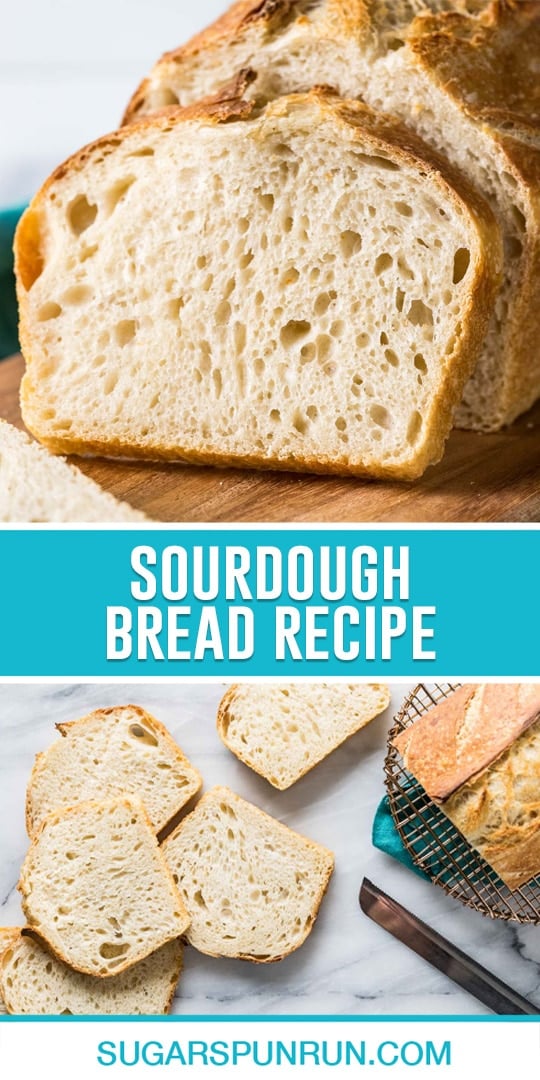
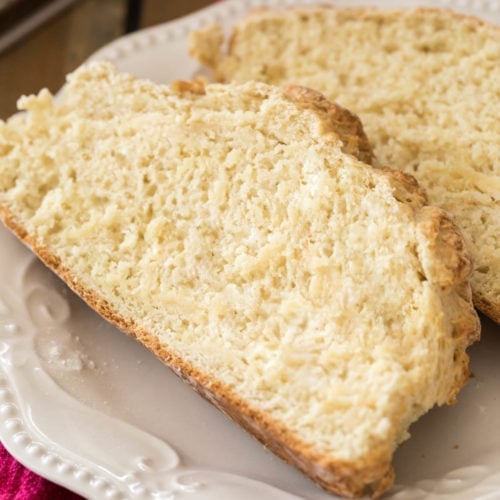
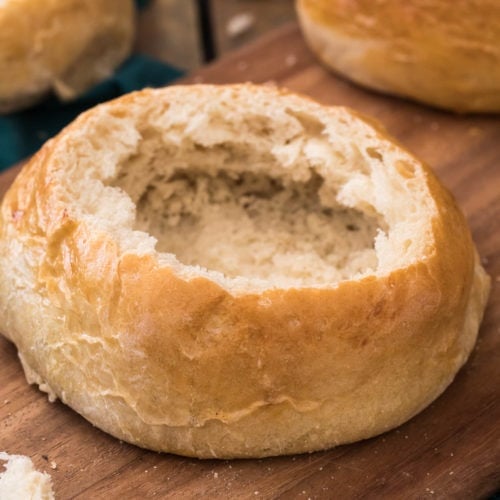
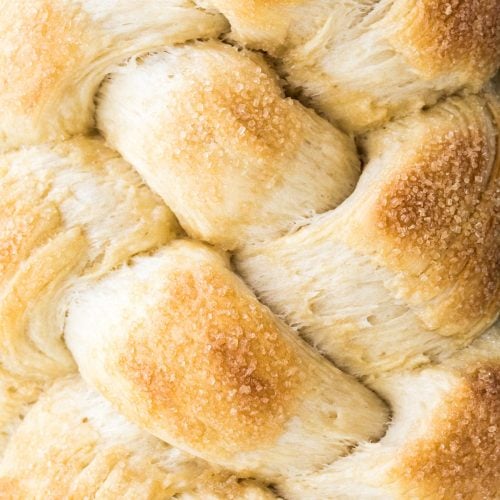
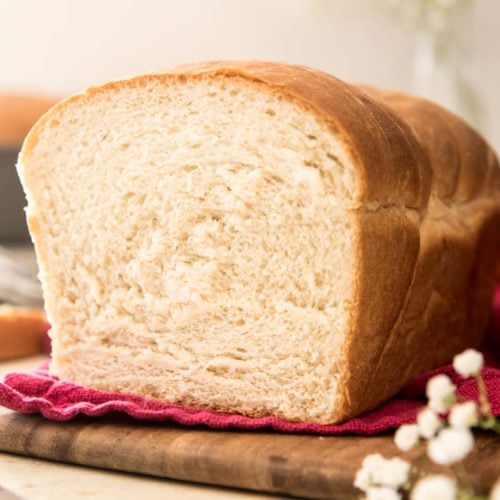




Analee
Help! I think I followed your recipe exactly with my scale, but my bread didn’t rise well and it also was gummy like inside..
Sam
Hi Analee! My first guess would be that the sourdough wasn’t active or strong enough for the bread, or it wasn’t given enough time to rise properly in a warm enough environment (however, conversely if it was overproofed this could also cause this issue). The gumminess could be caused by the dough fermenting for too long (if it was proofed longer than indicated or if it rose for too long), if it was under-baked, if your oven wasn’t properly preheated, or if it was cut into before it had cooled completely. I hope this helps!
Shannon
This recipe is very easy for a sourdough newbie like me, not to mention delicious! I moved it to a straight sided vessel after mixing, before autolyse, and it helped me gauge when it had risen adequately much easier.
Have you ever stuffed the dough? I was wondering if it would work to sprinkle mozzarella and diced (precooked to reduce grease) pepperoni on it just before rolling up and placing in the refrigerator?
I don’t see many sourdough stuffed bread recipes, but sounds delicious to me (:
Thank you so much for your excellent directions and tips!
Definitely a 5+ star rating!
Sam
I’m so glad you enjoyed it so much, Shannon! I personally have not tried stuffing it, but I would love to know how it goes if you do try it. 🙂
Steve Butterworth
Absolutely delicious. I have a couple of recipes I use our starter for, focaccia and jalapeño buns, that’s mainly it, using the Dutch oven to cook never appealed to me for some reason. My wife found this recipe to try where I had made an extra jar of starter, but didn’t need more of the same breads. With the outstanding directions, this was easy and fun to make, ending with the best tasting results I’ve ever had. Using the bread pan to cover was simple and felt more normal and easily accommodated. I mostly appreciated you having the ingredients and measures with every step. EVERYONE should learn from this and try to help people, not make them jump back to the top to check/confirm amounts with every next step. I am very thankful we now have this recipe, which with no doubt becomes a regular at our house too. I’m trying to now figure out how to cut uniform slices where we can use as our everyday bread and have it easily ready to utilize. Thank you for taking the time to perfect, organize/detail, and post for others to enjoy and feel like a successful baker.
Sam
I am so glad you enjoyed the bread so much, Steve! As far as cutting uniform slices goes, if you find a way, I’d love to know. In my house we typically just slice it off the loaf as we need it. If it needs to be frozen, we just slice it up and wrap the pieces to freeze. 🙂
Stephanie
hi!! great recipe! we have had it SO many times! p.s. ive also added 1 tsp of garlic powder, 1tsp of basil and 1 tsp of oregano and its…YUM. Question: do you think you can use whole wheat bread flour in this recipe? thank you!
Sam
Hi Stephanie! I’m so glad you’ve been enjoying the bread. I think you could substitute some of the bread flour for whole wheat, but I personally would start with a small amount (maybe subbing 1 cup of bread flour for whole wheat), checking the texture, and then adjusting from there to your liking. Using just whole wheat flour could make for a pretty dense/dry bread so I’d recommend starting with a blend. It’s also worth noting whole wheat flour is a bit more dry/thirsty than classic bread flour so you may not need as much or you may need a splash more water. I hope this helps!
Beth
Is it possible to bake these in a smaller size? I was hoping to do mini loaves as gifts. If so, is the cooking time similar?
Sam
Hi Beth! You could bake it in smaller pans, but honestly without having experimented I can’t say what the bake times would be. 🙁
Matt
this bread turned out amazing. I’m new to bread baking so I was terrified I would mess this up, since this was my first time making sourdough bread. my starter is about 2 weeks old (I know she’s still young) but the flavor and texture was 10/10
Sam
I’m so glad you enjoyed it so much, Matt! 🙂
Aimee
I am getting a slightly larger loaf pan. How do I adjust the recipe to better fit into a larger loaf pan. I think it’ll be about 11″x 6.8″. I am new to sourdoughing. lol! I have already tried your sourdough loaf and my whole family are now sourdough converts and are never going back. I can’t wait to bake more things with sourdough.
Sam
Hi Aimmee! Unfortunately without having tried it I wouldn’t be able to give you exact measurements for filling your pan. I would probably start by increasing the recipe by 25% and seeing how that works. Let me know how it goes! 🙂
Kristina
this recipe turns out great every time!
Sam
I’m so glad you enjoy it so much, Kristina! 🙂
Lesley Roberts
OMG best sourdough loaf recipe ever!!! The loaf is almost too pretty to eat. You gave perfect instructions and this is one of my best yet! I normally bake my sourdough free form in the Dutch oven & I’ve been searching for a loaf pan recipe that’s not enriched with milk, butter,& eggs. This is perfect, I just hope I can have success in my next bake! Thank you for a great recipe!😋
Sam
Thank you so much, Lesley! I’m so glad you enjoyed it so much! 🙂
Scotty
This was my first attempt at making sourdough and I have to say this recipe is fantastic!! Super helpful video!! The flavor is wonderful!!!
Thanks for the recipe Sam 😊
Sam
I’m so glad you enjoyed it so much! 🙂
Kelley Gately
First attempt turned out great! Stayed up late to do all the folding but so worth it. Thank you! I will definitely do this one again
Sam
I’m so glad you enjoyed it so much, Kelley! It really is an incredible bread. I can never get enough. 🙂
Michelle Auer
firstly this recipe is foolproof so thankyou!
after making a few times I decided to use 100 % Canadian strong wholemeal bread flour.
also added cashew nuts and mixed raisins at the last stage before putting into tin.
actually left in fridge about 32 hours.
result is a beautiful loaf not to heavy and the fruit and nut adds a nice festive feel 😄
Steph
I really like this recipe/method. Avid bread baker here. took a break for a while, now back to it. I like the no fuss bread pan, vs hoping my gluten development is sufficient to keep the dome shape. I tend to lean towards wetter dough. this just works well for me. thanks for sharing
Sam
I’m glad you enjoyed it, Steph! 🙂
Kay
I did everything by the recipe. I used mineral water, not tap water. My starter floated and was bubbly. My kitchen was cold, so I had my oven at exactly 85 degrees while the dough was supposed to be rising. I stretched it every 30 minutes for 8 hours and it still didn’t get to 80% so I baked it. It is super doughy/boggy of course.
Where am I going wrong? I LOVE your recipe instructions and think it SHOULD be working…any wisdom? THANK you!
Sam
Hi Kay! The starter may not have been quite ready, the float test isn’t completely fool proof. Did you let it rest in the pan overnight before baking or did you just bake it after the folding process? Not letting it rest after the folding process could be causing your issue as well. I hope this helps. 🙂
Val
Do you ever use other flour such as whole wheat or rye etc for your sour dough bread? Is it as elastic stretchy with whole wheat bread after folding it several times???
Sam
Hi Val! I have not used whole wheat flour so I can’t say for sure how it would go. Wheat flour is a bit “thirstier” so things could change a bit and I can’t say for sure how to make an adjustment without having tried it. 🙁
STEPHEN RUSSELL
I have been working to nurture my starter for more than three months now. I have learned that in bread making, with a starter, being precise and using the right and/or specific ingredients really matter and can change the outcome. I wanted to let you know that I did make this bread with my healthy and strong starter and it is delicious. I feel great that my starter is healthy and happy. Truly. Thank you. Over all this is an easy recipe, but like all treats with a starter, they take time and teach me patience and humility.
Sam
I am so glad you enjoyed it so much, Stephen! It definitely does take some patience, but it’s so worth it. 🙂
Sarah
Hi,
Can we substitute avocado oil for olive oil? Thank you!
Sam
Absolutely, enjoy!
Kat Q.
I love this recipe! I’ve tried several, and this one has become my go to. I’m not sure how to double it though… is it a true double, just x2 all of the ingredients?
Sam
Yup, just double all the ingredients. I usually make 2 loaves at a time but I double it separately, so I use two bowls but make the loaves simultaneously. Just personally makes it easier for me rather than dividing everything or having a large bulk of dough to manage/mix/stretch/fold.
Rhonda
Hi. I am making this for the first time..and it got too late in the day to complete. Can I freeze the dough after the autolyse stage (after letting it rest for an hour) and before the folding? I’m able to continue in the morning.
Thanks for your help!
Sam
Hi Rhonda! I would try refrigerating it and trying it the next day. 🙂
Schroomer
This well-written recipe has improved my sourdough loaf bread. Followed it to a T. For those that had a too wet dough, be careful how wet your hands are for stretch and fold. If you are doing 8 or more fold sessions, it may inadvertently add as much as a quarter cup of water to the dough. I wet my hands and then shake them off before grabbing the edge of the dough. Never thought of inverting a second loaf pan. Brilliant. Great oven spring and a nice big ear on the loaf. Going to try a 36-hour session in the fridge to amp up the flavor a little. Thanks for your post and I’ll look forward to exploring your other recipes.
Sam
I’m so glad you enjoyed it so much! Great tip about being careful to not add in too much water. 🙂
Julie
How many times do you let the dough set for the 30 min stretches before you let it rise fore the 4-6 hours and make loaves to rest in refrigerator?
Did I miss that?
Working on it this weekend!
My sourdough starter if finally ready🤗
Sam
Hi Julie! You want to do the stretch and fold process until the dough increases in size by about 80% and then once it’s in the loaf pan in the refrigerator, let it sit 12-24 hours. 🙂
Lauree
I loved this recipe as I have tried 3 different ones and this is the one that turned out best for us. I wondered for a variety could olives and garlic be added to this before refrigeration process?
Sam
So glad you enjoyed, Lauree! Thank you for trying my recipe! I think that would be absolutely fine. I sometimes fold in Asiago cheese during the stretch and fold process before refrigerating and that always works well! 🙂
Milton
Amazing flavor and very easy to do. I’m just learning to bake and I made this and it was a hit. My question is, if I make two or three loaves at a time do I need to adjust cook time?
Sam
Hi Milton! I often make several loaves at one time. I don’t bake them at the same time though. They will be ok to bake one after the other. I haven’t tried doing them all at once so I can’t say for sure how much, if any time it will add. I would imagine it would take another minute or so.